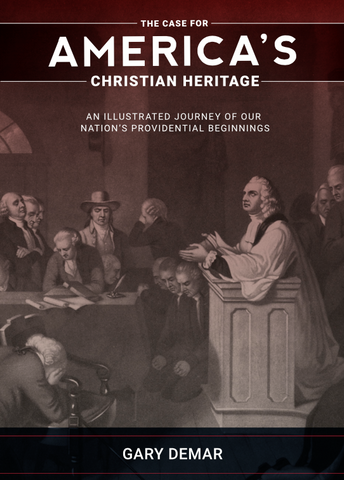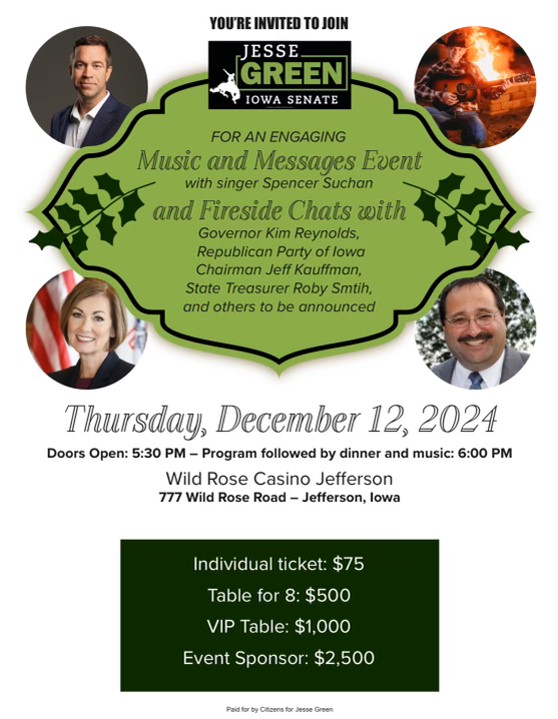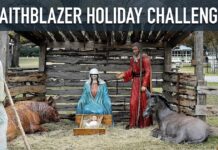A sign at an elementary school caught my attention. It read, “Bless America.” The question that came to mind was, “Who or what are they calling on to bless America?” Even with the unabashed call for God to bless America, there is no specific God in mind. Is it Aristotle’s “Unmoved Mover”? How about Jefferson’s absentee landlord god?
What are children told about Thanksgiving in our nation’s government (public) schools? Who or what are they thanking? Ancient fish that evolutionists claim are our grandmothers? “Grandmother Fish is the first book to teach evolution to preschoolers.” Are children to thank the molecules that sprung into existence and evolved from “the primal goo to you”?
Grove City College Professor Paul Kengor recalls a conversation he “had with a friend who works in the children’s section at Barnes & Noble” and “regularly briefs [him] on the latest political correctness and rank secularism pervading today’s books.”
She told him that in all the books on Thanksgiving, only one mentioned that God was the one being thanked.
Kengor asked her, “What are they giving thanks to?”
“They’re just thankful,” she said vaguely. “They’re simply thankful.”
“Thankful for what?” Kengor asked.
She again emphasized: “They’re just thankful.”
Thanksgiving’s Beginnings
In 1777, Congress issued a proclamation for a day of thanksgiving. A day was to be set aside for “solemn thanksgiving and praise.” The proclamation called upon all citizens to “join the penitent confession of their manifold sins,” and to offer “their humble and earnest supplication that it may please God through the merits of Jesus Christ, mercifully to forgive and blot them out of remembrance.”
On Thursday, September 24, 1789, the first House of Representatives voted to recommend—in its exact wording—the First Amendment of the newly drafted Constitution to the states for ratification. The next day, Congressman Elias Boudinot from New Jersey proposed that the House and Senate jointly request of President Washington to proclaim a day of thanksgiving for “the many signal favors of Almighty God.” Boudinot said that he “could not think of letting the session pass over without offering an opportunity to all the citizens of the United States of joining, with one voice, in returning to Almighty God their sincere thanks for the many blessings he had poured down upon them.”[1]
Roger Sherman spoke in favor of the proposal by reminding his colleagues that the practice of thanksgiving is “warranted by a number of precedents in holy writ [the Bible]: for instance, the solemn thanksgivings and rejoicings which took place in the time of Solomon, after the building of the temple…. This example, he thought, worthy of Christian imitation on the present occasion.”[2]
George Washington stated, “it is the duty of all nations to acknowledge the providence of Almighty God, to obey His will, to be grateful for His benefits, and humbly to implore His protection and favor.” He went on in his Thanksgiving Proclamation of October 3, 1789 to write, that as a nation “we may then unite in most humbly offering our prayers and supplications to the great Lord and Ruler of Nations, and beseech Him to pardon our national and other transgressions.”[3]
A People Full of Thanksgiving
The colonists of another era were aware of the many instances of thanksgiving celebrations found in “holy writ.” Thanksgiving, as it was practiced by the colonists, was a religious celebration that shared the sentiments of their biblical descendants, giving thanks to God for His faithful provision even in times of want. For these faithful people, thanksgiving came naturally. “Twice en route the passengers [aboard the Mayflower] participated in a fast, and once (two days after sounding ground beneath the Arabella) a ‘thanksgiving.’ When the sailing season ended with all ships accounted for, ‘we had a day of thanksgiving in all the plantations.’”[4]
There are numerous claims to the first official Thanksgiving celebrated in the New World. One of the earliest recorded festivals occurred a half century before the Pilgrims landed at Plymouth. “A small colony of French Huguenots established a settlement near present‑day Jacksonville, Florida. On June 30, 1564, their leader, René de Laudonnière, recorded that ‘We sang a psalm of Thanksgiving unto God, beseeching Him that it would please Him to continue His accustomed goodness towards us.’”[5]
In 1610, after a hard winter called “the starving time,” the colonists at Jamestown called for a time of thanksgiving. This was after the original company of 409 colonists had been reduced to 60 survivors. Extreme hardship did not deter the survivors from turning to God in thanksgiving. The colonists prayed for help that finally arrived by a ship filled with food and supplies from England. They held a prayer service to give thanks.
This thanksgiving celebration was not commemorated formally on a yearly basis. An annual commemoration of thanksgiving came nine years later in another part of Virginia. “On December 4, 1619, 38 colonists landed at a place they called Berkeley Hundred [in Virginia]. ‘We ordain,’ read an instruction in their charter, ‘that the day of our ship’s arrival . . . in the land of Virginia shall be yearly and perpetually kept holy as a day of Thanksgiving to Almighty God.’”[6]
Edward Winslow, in his important chronicle of the history of the Plymouth colony, reports the following eyewitness account of the colony’s thanksgiving celebration:
Our harvest being gotten in, our governor sent four men on fowling, that so we might, after a special manner, rejoice together after we had gathered the fruit of our labors. They four in one day killed as much fowl as, with a little help beside, served the company almost a week. At which time, among other recreations, we exercised our arms, many of the Indians coming among us, and among the rest their greatest king, Massasoit, with some ninety men, whom for three days we entertained and feasted; and they went out and killed five deer, which they brought to the plantation, and bestowed on our governor, and upon the captain and others. And although it be not always so plentiful as it was at this time with us, yet by the goodness of God we are so far from want, that we often wish you partakers of our plenty.[7]
While none of these Thanksgiving celebrations was an official national pronouncement (no nation existed at the time), they do support the claim that the celebrations were religious and specifically Christian in their origin and purpose. “Thanksgiving began as a holy day, created by a community of God‑fearing Puritans sincere in their desire to set aside one day each year especially to thank the Lord for His many blessings. The day they chose, coming after the harvest at a time of year when farm work was light, fit the natural rhythm of rural life.”[8]
The chain of times set apart for thanksgiving was not even broken during a time of war. Thanksgiving was joined with a spirit of repentance. On October 3, 1863, Abraham Lincoln declared that the last Thursday of November 1863 would be set aside as a nationwide celebration of thanksgiving. His proclamation stated:
No human counsel hath devised, nor hath any mortal hand worked out these great things. They are the gracious gifts of the most high God, who, while dealing with us in anger for our sins, hath nevertheless remembered mercy.… I do, therefore, invite my fellow citizens in every part of the United States, and those who are sojourning in foreign lands, to set apart and observe the last Thursday in November next as a day of Thanksgiving and praise to our beneficent father who dwelleth in heaven.
Thanksgiving Proclamations
Beginning with Lincoln, United States’ Presidents proclaimed that the last Thursday in November would be set aside for a National Day of Thanksgiving. Franklin D. Roosevelt changed the celebration to the fourth Thursday in November “to give more shopping time between Thanksgiving and Christmas.”[9] Ever since this pragmatic and commercial approach to Thanksgiving was promoted, its original meaning has steadily been lost.
The erosion of the original intent of Thanksgiving as it was practiced by the colonists and sanctioned by presidents and Congress, can best be illustrated by the way some textbooks handle the subject. One elementary school social studies book has thirty pages of material “on the Pilgrims, including the first Thanksgiving. But there is not one word (or image) that referred to religion as even a part of the Pilgrims’ life. One mother whose son is in a class using this book wrote . . . that he came home and told her that ‘Thanksgiving was when the Pilgrims gave thanks to the Indians.’ The mother called the principal of this suburban New York City school to point out that Thanksgiving was when the Pilgrims thanked God. The principal responded by saying ‘that was her opinion’ the schools could only teach what was in the books!”[10]
There is no doubt that these early Christian settlers thanked the Indians for their generosity in supplying venison to supplement the Pilgrims’ meager Thanksgiving rations of parsnips, carrots, turnips, onions, radishes, and beets from their household gardens. As the historical record shows, however, thanksgiving was ultimately made to the God of the Bible. “Governor Bradford, with one eye on divine Providence, proclaimed a day of thanksgiving to God, and with the other eye on the local political situation, extended an invitation to neighboring Indians to share in the harvest feast…. This ‘first Thanksgiving’ was a feast called to suit the needs of the hour, which were to celebrate the harvest, thank the Lord for His goodness, and regale and impress the Indians.”[11]
Early celebrations of thanksgiving were expressions of deep gratitude to God for life itself. Many who partook of the bounty from God’s creation set before them were thankful just to be alive. How times have changed in America.
Today, millions of Americans are taught to thank the government for everything. In reality and historically, our civil governors thanked God as the following Thanksgiving Proclamations show.
By the Continental Congress
The First National Thanksgiving Proclamation
IN CONGRESS
November 1, 1777
FORASMUCH as it is the indispensable Duty of all Men to adore the superintending Providence of Almighty God; to acknowledge with Gratitude their Obligation to him for Benefits received, and to implore such farther Blessings as they stand in Need of;
*****
That at one Time and with one Voice, the good People may express the grateful Feelings of their Hearts, and consecrate themselves to the Service of their Divine Benefactor; and that, together with their sincere Acknowledgments and Offerings, they may join the penitent Confession of their manifold Sins, whereby they had forfeited every Favor; and their humble and earnest Supplication that it may please GOD through the Merits of JESUS CHRIST, mercifully to forgive and blot them out of Remembrance.
George Washington
Proclamation—Day of National Thanksgiving
October 3, 1789
Whereas it is the duty of all nations to acknowledge the providence of Almighty God, to obey His will, to be grateful for His benefits, and humbly to implore His protection and favor; and
Whereas both Houses of Congress have, by their joint committee, requested me “to recommend to the people of the United States a day of public thanksgiving and prayer, to be observed by acknowledging with grateful hearts the many and signal favors of Almighty God, especially by affording them an opportunity peaceably to establish a form of government for their safety and happiness:”
*****
And also that we may then unite in most humbly offering our prayers and supplications to the great Lord and Ruler of Nations, and beseech Him to pardon our national and other transgressions; to enable us all, whether in public or private stations, to perform our several and relative duties properly and punctually; to render our National Government a blessing to all the people by constantly being a Government of wise, just, and constitutional laws, discreetly and faithfully executed and obeyed; …
Washington explains that greater freedom for the individual and entire nation will naturally flow from this godly inclination. Of the 432 words comprising his proclamation, he refers to God 15 times. Compare that with only two references in Obama’s, and those were included in quotations taken from Washington and Lincoln. Instead of serving God, Obama wants us to “give of ourselves in service to others.”[12]
John Adams
Recommending a National Day of Humiliation, Fasting, and Prayer
March 23, 1798
[T]hat all religious congregations do, with the deepest humility, acknowledge before God the manifold sins and transgressions with which we are justly chargeable as individuals and as a nation, beseeching Him at the same time, of His infinite grace, through the Redeemer of the World, freely to remit all our offenses, and to incline us by His Holy Spirit to that sincere repentance and reformation which may afford us reason to hope for his inestimable favor and heavenly benediction.
*****
And finally, I recommend that on the said day the duties of humiliation and prayer be accompanied by fervent thanksgiving to the Bestower of Every Good Gift, not only for His having hitherto protected and preserved the people of these United States in the independent enjoyment of their religious and civil freedom, but also for having prospered them in a wonderful progress of population, and for conferring on them many and great favors conducive to the happiness and prosperity of a nation.

The Case for America’s Christian Heritage
Even some of our nation’s Founders who did not identify as Christians could not escape the impact the Bible had on our nation’s founding and the moral precepts that held the fledgling nation together. America’s Christian heritage is writ large in its state Constitutions, charters, laws, symbols, and repeated stated reliance on the overruling providence of God. It’s not enough, however, to relive history. There’s much work before us to reset the foundation stones of a firm reliance on Divine Providence. The principles that were true and necessary centuries ago for building nations are equally true and necessary today.
[1] The Annals of the Congress, The Debates and Proceedings in the Congress of the United States, Compiled from Authentic Materials by Joseph Gales, Senior (Washington, DC: Gales and Seaton, 1834), 1:949-50.
[2] Annals of the Congress, 950.
[3] George Washington, A Proclamation: A National Thanksgiving, A Compilation of the Messages and Papers of the Presidents, 1789‑1902, ed. John D. Richardson, 11 vols. (Washington, DC: Bureau of National Literature and Art, 1907), 1:64.
[4] David D. Hall, Worlds of Wonder, Days of Judgment: Popular Religious Belief in Early New England (New York: Alfred A. Knopf, 1989), 166.
[5] Diana Karter Appelbaum, Thanksgiving: An American Holiday, An American History (New York: Facts on File Publications, 1984), 14‑15.
[6] Jim Dwyer, ed., Strange Stories, Amazing Facts of America’s Past (Pleasantville, NY: The Reader’s Digest Association, Inc., 1989), 198.
[7] Mourt’s Relation: A Journal of the Pilgrims of Plymouth, ed. Jordan D. Fiore (Plymouth, MA: Plymouth Rock Foundation, [1622] 1985), 67-69.
[8] Appelbaum, Thanksgiving, 186. The celebration of Christmas, in addition to Thanksgiving, has become an ordeal in censorship. Silent Night and other sacred songs have been stripped from public school Christmas pageants and replaced with Jingle Bells and Frosty the Snowman. Public school officials and school teachers are made to substitute “winter holiday” for Christmas. In St. Paul Minnesota, an affirmative action officer for the state tax department, banned what she called the “unwelcome greeting of Merry Christmas” via the department’s electronic mail. (“‘Merry Christmas’ offense, bureaucrat rules,” Atlanta Journal/Constitution [December 11, 1994], A11).
[9] Edmund H. Harvey, Jr., ed., Readers Digest Book of Facts (Pleasantville, NY: The Reader’s Digest Association, [1985] 1987), 125.
[10] Paul C. Vitz, Censorship: Evidence of Bias in Our Children’s Textbooks (Ann Arbor, MI: Servant Books, 1986), 3.
[11] Appelbaum, Thanksgiving, 9.
[12] Samantha Strayer, “What Our Presidents’ Thanksgiving Proclamations Tell Us About America” (November 25, 2015).
















